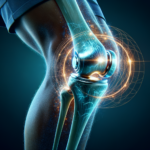Understanding Arthritis and Its Impact
Arthritis, a condition characterized by inflammation of the joints, affects millions worldwide and can significantly impair daily activities. This ailment is not limited to the elderly; it can impact individuals of all ages, including children. The most common types include osteoarthritis and rheumatoid arthritis, each with distinct causes and symptoms. Osteoarthritis typically results from wear and tear of the cartilage, while rheumatoid arthritis is an autoimmune disorder where the immune system attacks healthy joint tissues.
The impact of arthritis extends beyond physical discomfort. It can lead to emotional and psychological challenges, as chronic pain often correlates with anxiety and depression. According to recent studies, nearly 50% of arthritis patients experience some form of mental health issue. Understanding the comprehensive impact of arthritis is crucial for developing effective management strategies that address both the physical and emotional facets of the condition.
With advancements in medical research, 2025 has brought new insights into arthritis management, emphasizing a holistic approach. This involves not only medical treatment but also lifestyle modifications and mental health support. By understanding the full scope of arthritis, individuals can better navigate their journey towards pain relief and improved quality of life.
Exercise: A Vital Component of Arthritis Management
Exercise is often regarded as a cornerstone in managing arthritis symptoms. While it might seem counterintuitive to move when in pain, physical activity can significantly reduce discomfort and improve joint function. Regular exercise helps to strengthen muscles around the joints, maintain bone strength, and improve overall endurance and flexibility.
According to a 2025 study, individuals with arthritis who engaged in at least 150 minutes of moderate exercise per week reported a 30% reduction in pain levels. Activities such as swimming, cycling, and walking are particularly beneficial as they are low-impact and reduce stress on the joints. Additionally, incorporating strength training exercises can help build muscle support around the affected areas, further alleviating pain.
However, it is essential to approach exercise with caution. Overexertion can lead to increased pain or injury, so it’s crucial to listen to your body and consult with a healthcare professional before starting any new exercise regimen. A personalized exercise plan, tailored to individual needs and limitations, can be a powerful tool in managing arthritis effectively.
Diet and Nutrition: Fueling Your Body for Relief
Nutrition plays a pivotal role in managing arthritis symptoms. A balanced diet rich in anti-inflammatory foods can help reduce joint pain and swelling. Omega-3 fatty acids, found in fish like salmon and mackerel, are known for their anti-inflammatory properties and can be beneficial for those with arthritis.
Additionally, incorporating a variety of fruits and vegetables into your diet can provide essential vitamins and antioxidants that support joint health. Foods high in vitamin C, such as oranges and strawberries, can help protect cartilage and reduce inflammation. Similarly, vitamin D and calcium are crucial for maintaining bone health, particularly for individuals with arthritis.
A 2025 nutritional study highlights the benefits of the Mediterranean diet for arthritis patients. This diet emphasizes whole grains, lean proteins, and healthy fats, which collectively contribute to reduced inflammation and improved overall health. Avoiding processed foods, excessive sugar, and saturated fats can also help mitigate arthritis symptoms.
By making mindful dietary choices, individuals can support their body’s natural ability to combat inflammation and improve joint function, leading to a more active and fulfilling life despite arthritis challenges.
Mind-Body Techniques: Harnessing Mental Strength
Managing arthritis is not solely a physical endeavor; mental resilience plays a critical role in pain management. Mind-body techniques such as meditation, yoga, and tai chi have gained popularity as effective strategies for managing arthritis pain.
Meditation and mindfulness practices can help reduce stress and improve mental clarity, which in turn can alleviate pain perception. A recent study from 2025 found that individuals practicing mindfulness meditation experienced a 25% reduction in arthritis-related pain. These practices encourage a focus on the present moment, helping individuals navigate their pain with greater ease and less anxiety.
Yoga and tai chi, which combine physical movement with mindfulness, offer dual benefits. Not only do they improve flexibility and strength, but they also promote relaxation and stress reduction. These practices can be adapted to suit individual abilities, making them accessible for those with varying levels of mobility.
Incorporating mind-body techniques into a daily routine can enhance overall well-being and provide a sense of control over arthritis symptoms, empowering individuals to lead more balanced and pain-free lives.
Medical Treatments and Innovations
While lifestyle changes are crucial, medical treatments remain an integral part of arthritis management. Advancements in medical research have led to innovative treatments that offer new hope for those suffering from arthritis pain.
Non-steroidal anti-inflammatory drugs (NSAIDs) and corticosteroids are commonly prescribed to reduce inflammation and manage pain. However, recent developments in biologic drugs and disease-modifying antirheumatic drugs (DMARDs) have revolutionized arthritis treatment. These medications target specific components of the immune system, offering more precise and effective management of symptoms.
Furthermore, 2025 has seen significant progress in regenerative medicine. Stem cell therapy and platelet-rich plasma (PRP) injections are emerging as promising options for repairing damaged joint tissues and reducing inflammation. These treatments aim to harness the body’s natural healing processes, offering potential long-term relief for arthritis patients.
As medical science continues to evolve, staying informed about new treatments and therapies can empower individuals to make educated decisions about their arthritis management. Collaborating with healthcare professionals to explore these options can lead to a more tailored and effective treatment plan, enhancing quality of life for those living with arthritis.








